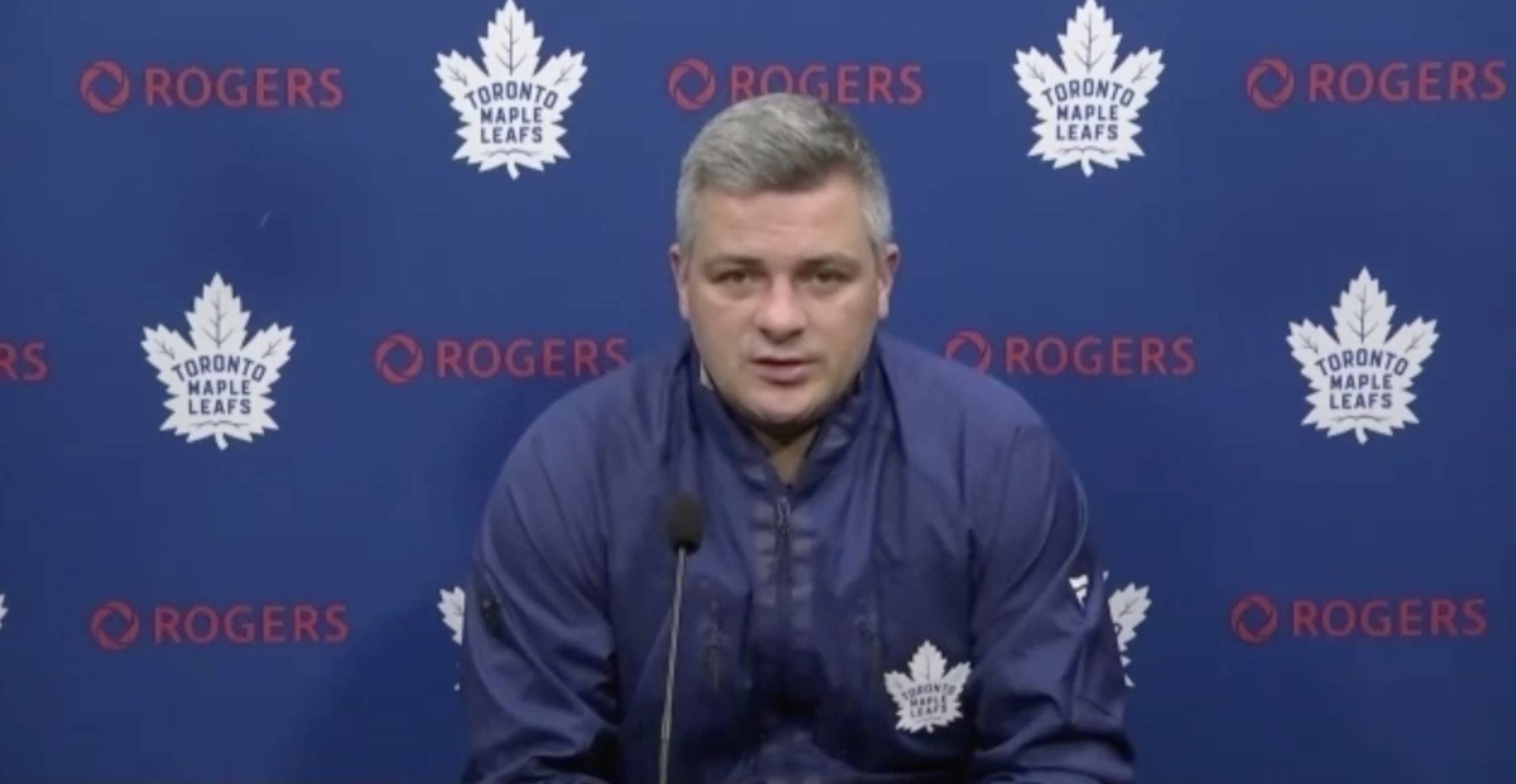After practice on Tuesday, Sheldon Keefe discussed the team’s offensive zone “systems” and “structure,” the upcoming matchups against Montreal, John Tortorella’s benching of Patrik Laine in Columbus, and adjustments on the power play over a season series.
What’s the key to coaching Mitch Marner and Auston Matthews in the offensive zone when their instincts allow them to take over and do things that a lot of people don’t see coming?
Keefe: The key is to allow their instincts to take over. That is part of who they are, and that is why you want to have players like that. You need to give them the freedom to allow those instincts to take over.
As coaches, we need to put in systems and structure that allow those instincts and skill to thrive. Also, we need to maintain and guide that process through giving reminders or key points and information about what the opposition is trying to do to defend them.
It is a combination of freedom and structure and information.
Does a lot of what they do go outside of the structure — in a positive, not a negative way?
Keefe: I wouldn’t say so. With the structure we have in the offensive zone, it allows for a lot of movement and a lot of opportunities for players to use their skills and move to different spots. There is nothing really set in terms of where people should be in our structure. It is a matter of motion, movement, replacing people, replacing spots.
If you look at [the goal] last night as an example, it is not exactly something you would practice, but it is well within the structure and the things that we talk about.
What comes to mind for you with the Toronto-Montreal rivalry? These teams have not been good at the same time for a long time. What does it mean to you?
Keefe: I would say it is a privilege, first of all, to be a part of it. There is so much history behind it — certainly long before my time, whether it is as a young guy, as a player myself, or as a coach. It is a privilege to be a part of it. It is exciting. There are passionate fan bases across the country and across the world, really, that would be excited about it. I think it is a great thing.
Did you feel you could get the guys’ attention today a little bit better after not as strong of a performance last night? If the team had blown Vancouver out three times in a row, would maybe things have crept into their game that maybe won’t creep in now?
Keefe: I do. The way I described it to our guys: Now that we are through the other side of it, I felt last night was a bit of a gift for us. As we transition from one series to the next here, we know the challenges that come with playing Montreal. It is going to be a much different type of game than we’ve seen. Certainly, what we saw last night from Vancouver was a little more of an indication of what to expect in terms of there being less time and space with the puck and the ability to smother you and counter and control play.
If we are not sharp and ready to play and find a way through those kinds of things, you get nights like last night. It certainly was not enjoyable going through it, but now that you are past it… I didn’t have to talk much today, for example. I didn’t have to talk much about last night. It was fairly obvious. We know what we are up against here.
We just moved on and focus on Montreal today and tried to get the team ready and prepared for that.
Patrik Laine getting benched in Columbus is getting a lot of attention today. How would you describe your approach to player accountability? When is the right time to crack the whip?
Keefe: I think everything is situational. It is usually an accumulation of things. You don’t overreact to one incident or one different thing. For me, it is usually the end of a long line of events that have occurred and a lot of communication and discussion. It is not something I resort to all that often.
Certainly, for your top guys, whether you take them off the ice from a shift or they miss a shift, it is something you look at. There is still the reality of the game works. If you are a guy who is lower in the lineup, sometimes it is going to cost your spot in the lineup altogether rather than an in-game benching. Sometimes an in-game benching — while you are sending a message to a certain player — it can also work against a team and its ability to win a particular game. There is a balance there as well.
Having played for him, what do you recall about the way John Tortorella approached accountability? Did you learn anything from that, or what stood out from his approach?
Keefe: Torts is very direct. He is very honest. As I was saying before, what I really learned from that is just that, when it comes to something like that, if you are going to take away somebody’s ice time, knowing Torts, there would have been a lot behind the scenes that would’ve led to such a decision. It wouldn’t be anything abrupt. He is very purposeful in the way he goes about things.
Looking at the power-play units, when you are playing the same six teams, how frequently should tweaks or adjustments be made to keep the opposition honest?
Keefe: That certainly is a part of what you do. You are always looking at things, especially when you are playing the same team from one night to the next. You look at what worked and what didn’t, and you try to think ahead. If something worked really well, how will they try to adjust to that? If they do, what will we want to do to counter? You are thinking about those kinds of things.
But when you are having success, you try not to change too much and try to really force the opposition to show that they are going to change to stop you. But you do have to have a sort of Plan B in mind in cases things go dry. That is something we are always talking about and thinking about.

































